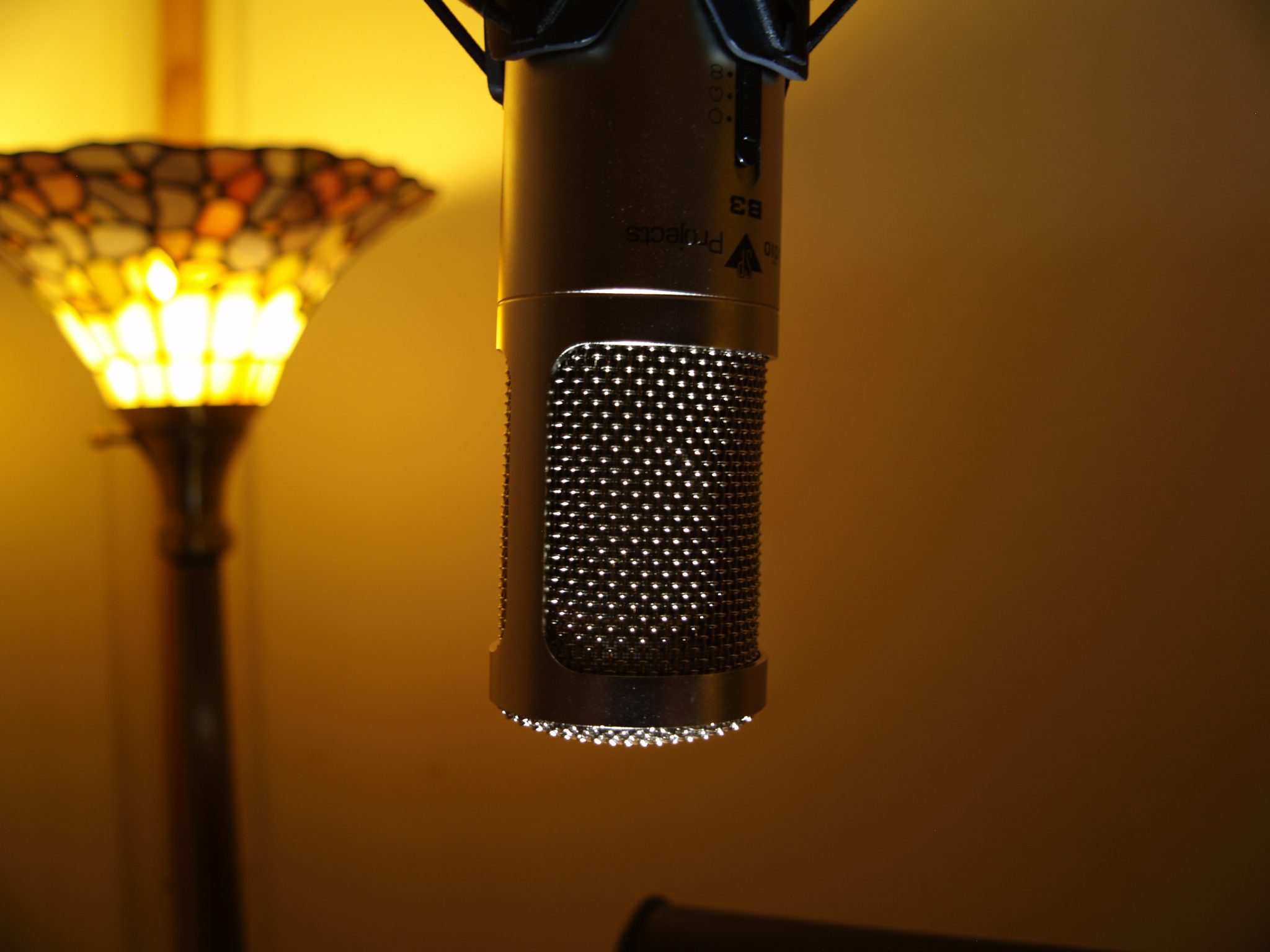
Timing Is Everythin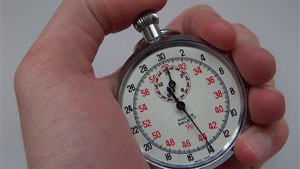 g
g
If you are going to be recording a voice over in the studio, whether in a professional facility or your own home studio, you have got to have good flow and good cadence in your script reading to be believable. Understanding sentence structure plays a big role in the timing of your delivery.
Just as important as having a sense of timing is having a sense of TIME, in other words, to get a sense of the actual length of the script.
Our World Needs Heroes
There are very talented people in the industry writing excellent copy for a number of different brands, and these people are often expected to be exceptionally creative. That can’t always be easy when you are limited to 60, 30 or even 15 seconds.
They are also faced with the demands of the client that may insist on certain phrases or products that must be in the copy. Add that to not yet knowing who your voice talent is going to be and at what speed they will actually be reading the script.
Here is where you have a chance to be the hero no matter what kind of studio you are working in.
Make sure you’re not this guy and don’t let this happen in your session!
Do Your First Read For Time
If you are working in a commercial studio you can simply ask the engineer to put a clock on you right from the start. Most of the time we do but we might be busy setting levels, so don’t be afraid to suggest it. I would actually say that you should make it clear to everyone that you are going to do a read for time so that you don’t get interrupted in the middle of the script by the producer or the engineer.
Then, when the engineer is ready, start reading and DON’T STOP. Even if you make a mistake, DON’T STOP. If you stumble, don’t go back to the beginning of the sentence. Keep going through the script as if everything is perfect and try keeping a natural pace all the way until the end.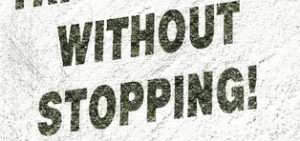
Here’s The Thing: Everybody Makes Mistakes
All the professionals make mistakes, and let me tell you, they make plenty of them. Mistakes are part of the process and it will not be avoided no matter how good you are. But this is where people just starting out in the industry get intimidated and embarrassed and freeze. And they start to apologize and make excuses and fumble around.
Guess What?
You’re the only one that’s worried about it. It is a natural part of recording anything. Get as much of it out of the way as you can with the first read. Make all your mistakes right off the top.
There are so many benefits to this that everyone can gain from right at the start of the session.
- If you continue reading all the way through, not taking the time to stop, point out and then dwell on anything you may have stumbled over, it will actually save you from any embarrassment . After you have just mentioned that you are reading for time, no one is going to be focusing on your read, we will only be concerned with how long the script is.
- It will immediately be obvious if the script is too long or too short, so if copy needs to be cut or added it can happen right away. This is especially important if a phone call needs to be made to the client or copywriter and waiting is involved in getting an answer.
- It will save you the headache of many takes of trying to get the perfect first sentence or paragraph before moving on to the next line. This happens all the time because an engineer or producer might get caught up with having you inflect a certain way before you get all the way through the script. You may also avoid wasting time on copy that may not even be in the final edit.
- You will quickly be familiar with what you need to do for every aspect of the script
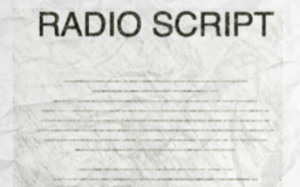 for the next run through. There is a saying in the industry that you should “intentionally blow your fist take because it will tell you the right thing you need to do next”.
for the next run through. There is a saying in the industry that you should “intentionally blow your fist take because it will tell you the right thing you need to do next”.
- It will avoid fatigue on your voice so you are not worn out before you get to the tag line, allowing for more consistent takes in case editing needs to be done.
- You will look and feel like a true professional for having the knowledge and taking the initiative to make this the first step in the recording process to insure a smooth running session. Every person in the studio will also feel their confidence go up for having hired you and getting to work with someone of your expertise.
- And most importantly, it increases the profit margin for everyone involved, especially if there is a fixed rate for any of the services in the production process, like your talent fees.
It’s Just Good Practice
Now, I am not saying that this should be solely the voice talents responsibility. A good producer or engineer will usually take this crucial first step in the process, but sometimes chaos and delays before a session can cause this element to be overlooked.
The more you know about the recording and editing aspects of the industry, the better impression you will make on the people that can get you more work.
This is not just for the commercial studio environment either, you will benefit from practicing this important first step even if you are in your home studio working alone or with a producer or engineer over a phone patch.
Let’s Take This One More Time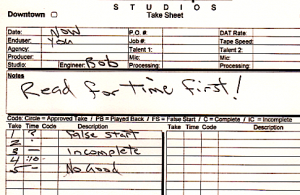
When you need to do a voice over in the studio, prevent that nightmare where focus is put on the read through partial take after partial take, only to find an hour later that the script is too short or too long.
Make it known that your first read will be for time and read all the way through, ignoring your mistakes, and you will know right away if copy needs to be cut or added.
If it is your first time working with the client, their first impression will be one of a seasoned and professional voice talent. It could be an important part of your session that gets you called back for the next job.
I hope this has helped you in how you approach your first take. Do you have any grueling session stories? Is there any way you could have made it easier? Drop me a comment below and share your story!
Jim

Hi Jim,
Once upon a time….
Ha…did a bit of this is primitive situation to lay down audio for a training video for America West/US Airways Airlines back a few years…
Made me laugh to realize what a crazy amazing thing we did with no studio…it turned out pretty good all things considered. Good chuckle around your little spoof there, humor, I get it! “-)
Good to have a site in which I can bounce around and maybe pick up a few things as I take another tack in my retirement.
Thanks again,
Linda
I’m glad that I can be of service AND make people laugh at the same time. There is just not enough of that around these days.
In an audition, that may be the biggest reason not to pause unnecessarily after the first word – because most of your competitors will. We could add more points to this list, and you might quibble over which should be in the top half dozen, but the issues you mention happen often and are unnecessary. Thanks for a great article and for what you are doing for the audio community.
Thank you Frederic,
I wouldn’t say that it is an issue you need to directly worry about with competitors. But it does keep you a more professional voice talent. Things happen in sessions but many of them can be avoided with some simple steps. You sometimes don’t realize what a time saver it can be until it starts to go in the other direction.
Awesome Article, loved the video, gave me a good laugh after a long night at work. I’ve never done voice over but I can see myself in that position I would be doin constant retakes. 🙂
Thanks,
That is basically what it is all about. Retakes until you get what you are looking for. Nobody does it the first time and if they do it is a rare event.
Thanks for the comment!
Jim,
I have been doing voiceover for some time and watching your video on the recording/talent/engineer/client process was dead on. I have been in those situations where I won’t “pre-read” the copy for time. Most of the time I look at the page and know if it’s good for time, short or too long. You remind me that at least knowing where the copies story is going to go is a big part of it.
I also want you to know that I was laughing out loud, or LOL while watching your session re-creation. I’ve been there, done that and have experienced the embarrassment of which you speak of.
Thanks for this site. Even old guys like me can still be reminded of how important the basics are.
Hi Steve,
This is a very common scenario that I have obviously exaggerated for fun but very true in many situations. As you may know I too have been around for a long time and have seen it all. In this industry you learn pretty quickly how to make a recording and editing session go smoothly for the benefit of every one involved. It is essential to know how to make people feel comfortable in their mistakes so that we may continue on as professionals.
It is so easy these days for a client to go somewhere else, and they will only work with the people that put them at ease and make them feel like they have come to the right place. Nothing does that better than knowing what you are doing and immediately conveying that to the producer or client.
Thanks for your input, it is much appreciated to hear from a veteran in the industry!
WOW,This is pretty impressive. I have never given any thought to voice overs in the past. Just goes to show you that you learn something new everyday. I doubt that I will ever be in need of such a thing, but it is interesting knowledge to have. Great website!
Hi,
Thanks for your thoughts. As a WA member, you may at some point want to think about training videos as a way of moving up in the community. There is good information here on how to sound your best.
http://voiceathome.com/how-to-improve-video-sound-quality
http://voiceathome.com/why-use-a-pop-filter-the-easy-answer
Hi Jim, I have got to learn a lot, I have made some videos and tried to talk them through. I have put them online, but you are a natural. You have a real nice voice over in the studio:) In my videos there are way out to much ehm’s. And I have difficulties to talk English too. I will have to practice a lot, Loes
Hi Loes,
Yes it does take practice but it also takes editing. 🙂 As you can see in my video, I have acquired a lot of equipment that makes me sound good and can edit out the mistakes. Of course I left them in for this example, but if I were to edit the audio from the script that I read, with that nice selection of music, it would be a finished radio commercial.
Thanks for your comment and your help!